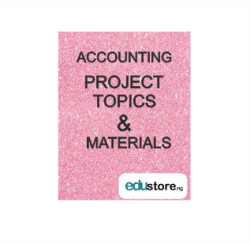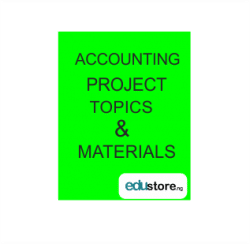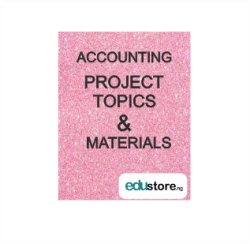ABSTRACT
Chapter one contains the introduction and analysis of fraud. So many people define fraud in different way because of its in explicit meaning. It also concentrate on the limitation, objectives and importance of auditing in our banking industry
While chapter two deals with the definition of Auditors and their duties in banking industry. It also discussed about various types, causes, effects of frauds in banks as well as the role of Auditors to hip it in the bud.
The paper equally looked into the means of preventing or reducing the incidence of fraud in the banking industry or operation. From the analysis, it was established that there are incidence of fraud in our banks. It was equally discovered that fraud occurs more frequently on current account department than in any other departments and this is normally done through forged cheques. It was also discovered that bank frauds can hardly succeeded without the aid of bank staff.
Finally, it was discovered that frauds have effects in operation and progress of the frauds have effects in operation and progress of the banks despite the control technique that have been instituted by the management of the bank.
TABLE OF CONTENT
Title page
Approval page
Dedication
Acknowledgement
Abstract
Table of contents.
CHAPTER ONE
1.1 Introduction
1.2 Background of the study
CHAPTER TWO
2.1 Who is an auditor and duties of an auditor
2.2 Types of fraud
2.3 Causes of frauds in banking industry
2.4 Effect of fraud in banks
2.5 The role of auditors in fraud prevention
CHAPTER THREE
3.1 Summary / findings
3.2 Conclusion
3.3 Recommendations
- For Reference Only: Materials are for research, citation, and idea generation purposes and not for submission as your original final year project work.
- Avoid Plagiarism: Do not copy or submit this content as your own project. Doing so may result in academic consequences.
- Use as a Framework: This complete project research material should guide the development of your own final year project work.
- Academic Access: This platform is designed to reduce the stress of visiting school libraries by providing easy access to research materials.
- Institutional Support: Tertiary institutions encourage the review of previous academic works such as journals and theses.
- Open Education: The site is maintained through paid subscriptions to continue offering open access educational resources.






